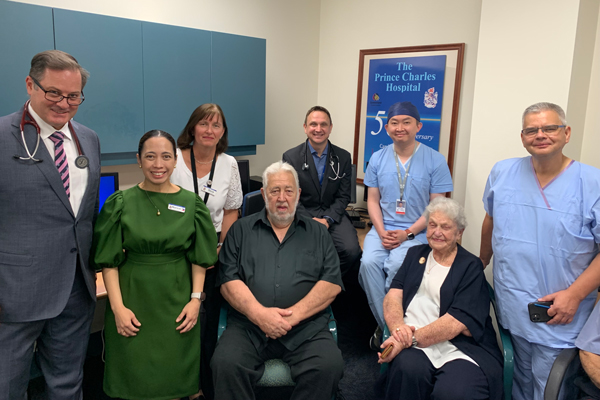- Foreword
- Message from Board Chair & Chief Executive
- 2023 Clinical Research Fellowships
- A message from the RBWH Foundation
- A message from The Common Good
- Metro North Research Excellence Awards
- Research stories
- ICU of the Future
- New approach ruling out pulmonary embolism
- Improving access to healthcare in the prison environment
- Safety and efficacy of peripheral versus centrally administered vasopressor infusion
- COVID-19 learnings set to inform future policy
- Telomere study could provide key to treating debilitating lung disease
- Productive Ward – Releasing time to care
- Brain organoids to revolutionise epilepsy treatment
- Reducing weight stigma in maternity care
- Parkinson’s Disease Check-In program giving people a voice
- Trial brings new treatment for common heart condition
- Teledentistry study shows promise in residential aged care
- Research fellow to boost Oral Health evidence-based care
- Study explores best approach to surgery for painful shoulder osteoarthritis
- The development and pilot testing of a stroke telerehabilitation decision toolkit
- Metro North Health delivers world-first breast scaffold surgery
- Regenerative jawbone hard at work care of collaborative Metro North Health approach
- Jamieson Trauma Institute leads e-scooter and e-bike injury research to drive community safety
- Forgotten fathers in pregnancy and obstetrics
- Putting the Spotlight on nursing and midwifery research
- Improving the health self-efficacy of stroke survivors
Trial brings new treatment for common heart condition

Members of the Cardiology Clinical Research Centre team with the first two patients to undergo the new mitral valve procedure.
A cardiac research team at The Prince Charles Hospital (TPCH) is trialing an innovative treatment for patients suffering from a common heart valve disease, which prevents the need for open heart surgery.
Mitral regurgitation, or mitral valve leaking, occurs when the leaflets or flaps of the heart’s mitral valve do not close completely, allowing blood to flow backwards as the heart pumps. It can be caused by degeneration of the leaflet tissue or enlargment of the heart associated with a cardiomyopathy, a weak heart muscle.
Mitral regurgitation can seriously impact on a person’s quality of life, causing shortness of breath and extreme fatigue, and, if left untreated, can ultimately lead to heart failure and death.
The Cardiology Clinical Research Centre led a first-in-Southern-Hemisphere trial of a new minimally invasive treatment which involves delivering a specialised valve system via a catheter into the groin, leading up into the heart. Here it encircles the native mitral valve leaflets with a docking station or platform, in which a balloon expandable tissue heart valve is then implanted, forming an ensemble.
This ensemble uses the patient’s native mitral valve leaflets to make a watertight seal with the circular mitral valve replacement, meaning no stitches are required to hold the new valve in place.
Due to the precise positioning needed to successfully place the docking station and the valve , the procedure is performed under the guidance of three-dimensional echocardiograms, providing real-time images of the heart and the valve. A specialised echo probe is placed in the oesophagus, allowing a dedicated team of imaging cardiologists to guide the procedure.
TPCH Interventional Cardiologist and trial lead investigator Dr Dale Murdoch said until now, the only treatment option for mitral valve replacement has been open heart surgery which many patients are not eligible for because of their age or other pre-existing medical conditions.
“The new valve system is a game changer for patients with mitral regurgitation,” Dr Murdoch said.
“Mitral regurgitation can be a very debilitating condition which can lead to a poor quality of life. We see many patients at this hospital with mitral regurgitation who have severe heart failure symptoms, and often require emergency admission.
“The new valve technology means we can offer patients an alternative form of effective treatment which is less invasive and promotes a quicker recovery.”
To date, two patients have undergone the new treatment, with positive results. Under the trial, patients will continue to be regularly monitored through the Cardiology Clinical Research Centre.
It is anticipated that if trials are successful, hundreds of Queensland patients could benefit from the new treatment each year.
